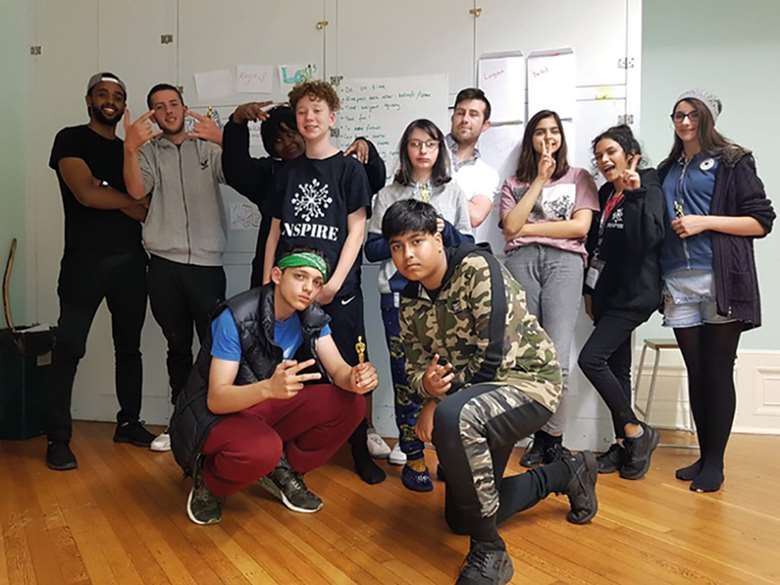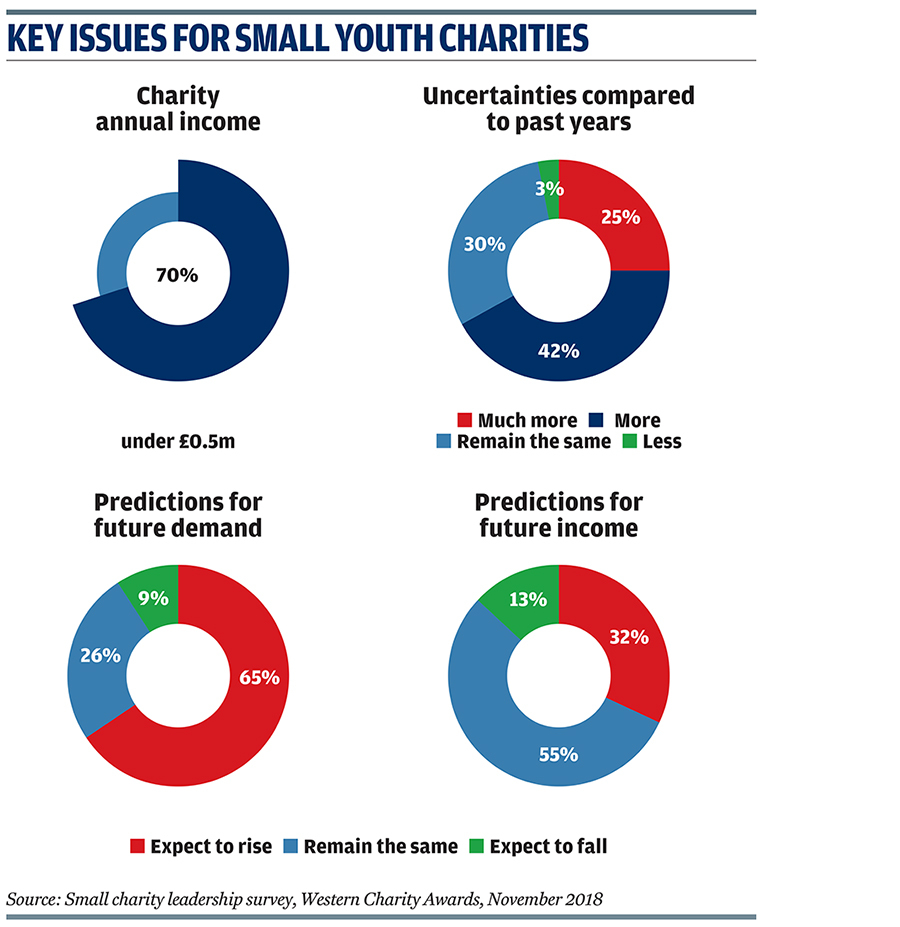Youth charity leaders anticipate increase in income and demand
Derren Hayes
Wednesday, January 2, 2019
Nearly three times as many youth charity leaders expect annual income to rise in 2019 compared to those who think it will fall, but most say they want more support to develop partnerships with local businesses.

Leaders of small- and medium-sized children and young people's charities are optimistic about the coming year, despite the uncertain economic outlook as a result of Brexit - this is the key message from a survey of the sector undertaken in late 2018 by the Weston Charity Awards.
Now in their sixth year, the awards provide support to charities with an annual income below £5m to help them grow and become more financially sustainable (see below).
The leadership survey acts as a barometer for the economic health of the sector and helps identify emerging issues.
The 2018 survey was completed by 371 charity leaders, 69 of whom worked in the children and young people's sector.
Only 13 per cent of the youth sector leaders who responded expect annual income to fall, while nearly a third say it will increase (see graphics). Medium-sized charities - those with incomes of £0.5m to £5m - are more confident than smaller ones, with all 21 expecting income to rise or stay the same.
Demand for support
The survey also highlights the growing demand for support from voluntary organisations in the children and young people's sector.
Two-thirds of respondents expect to help more children and young people, with 26 per cent expecting a fall in demand.
The results are lower than the 78 per cent of respondents from the overall survey who expect demand to increase. However, four out of five medium-sized youth charities expect to help more people in 2019.
Despite the optimism over their future prospects, youth and children's charities recognise there are growing uncertainties affecting their operating environment.
Two-thirds of respondents said there was either "more" or "much more" uncertainty than in previous years, while just three per cent said uncertainty had reduced.
Interestingly, a quarter of youth sector respondents said small charities collaborate "very poorly" with large charities, and a further 58 per cent said it was "poor". Two-thirds of respondents said collaboration with the private sector was poor or very poor, and 55 per cent said the same for collaborating with local government.
Good collaboration
By comparison, 60 per cent said they collaborate "well" or "very well" with other small youth organisations.
The survey also revealed that many small youth organisations are not getting the support they need from national and local government, and are hungry for more help from local communities and businesses.
Of the 69 respondents, 56 said they don't get the support they need from central government, 33 said they don't get sufficient support from councils and 32 said they don't from local businesses. In addition, 71 per cent said they needed more help from local people, 51 per cent from local businesses, 43 per cent from local authorities and just six per cent from national government.
One-third of respondents said they now received more help from local people, and 29 per cent reported improved support from local businesses.
However, 22 per cent said support from local government had fallen in the past year.
The support most youth charities are looking for from local people includes help with fundraising, volunteering, and professional skills provided pro bono.
Skills required
The skills that are most sought by youth charities are IT and digital, building partnerships with the commercial sector and fundraising.
These findings reflect the key challenges the small charities had faced over the past year - setting up new partnerships was cited by 35 per cent of respondents, IT upgrades and failures by 33 per cent and the loss of a major source of funding by 26 per cent.
The most cited challenge was complying with new legislation and best practice by two-thirds of respondents.
Around 70 per cent of respondents to the survey were charity chief executives. When asked what issues "keep them awake at night", 88 per cent said they worried most about funding; time and resources was cited by 57 per cent; concerns about current staff were highlighted by 39 per cent; and recruiting the right people by 26 per cent.
A further 32 per cent worried about their own ability to do the job, while a lucky four per cent said they never worried about their work.
Despite the concerns and challenges, 84 per cent of leaders from the youth and children's voluntary sector said they would recommend working for a small charity to a friend.

Case Study
Focus develops links with local business to boost income and protect against future uncertainties
Focus is a Leicester-based charity that supports young people to develop their self-confidence, self-esteem and aspirations. It works with young people aged 13- to 19-years-old, or up to 25 in certain circumstances, from across the city, with a specific focus on those from the most deprived communities.
Focus director Matt Lilley says: "I'm an eternal optimist. Although the climate is difficult for funding, we're better placed than most to handle it. We have taken the decision to diversify our income streams and have focused on developing relationships with local businesses - a process that takes time.
"There's more uncertainty than ever; we don't know how Brexit will affect charity funding or the lives of the young people we serve, but we have become better at dealing with unknowns.
"I recently participated in a year of strategy coaching with four business leaders through the Pilotlight programme. My Pilotlighters helped Focus develop a new fundraising strategy and we worked together on honing a strong business pitch by developing our positioning and pre-empting concerns. You can't underestimate the importance of being able to demonstrate strong charity leadership in order to gain trust from potential partners. We've moved from only thinking about the short to medium term, to looking at the long term and the bigger picture.
"Help from local businesses has come in many forms - from practical, day-to-day advice on our telephone system through to becoming trustees or using our allotment for team building exercises. We don't just ask for handouts, but also think about what's in it for the businesses. As we build these relationships, we're delighted when funding is attached such as being announced recently as KFC's charity of the year in the East Midlands."

Case Study
Hull child poverty charity maximises corporate links to attract funding and volunteers
One in three children in Hull is growing up living in poverty. Hull and East Yorkshire Children's University exists to provide these children with aspiration raising experiences that will inspire them to achieve more with their lives helping to break the cycle of deprivation they are growing up in. In the 2017/18 academic year, 6,467 children went on these experiences and 98 children living in care took part in our Children in Care programme.
Natasha Banke, director, Hull and East Yorkshire Children's University, says: "Running any charity is challenging with the funding landscape changing so quickly and increasing competition for grant and trust funding. Our budget limitations can make it hard to attract talented staff. I'd also like to be able to invest more in long term impact evaluation which would help us make an even stronger case to funders. As a Weston Charity Awards winner, we've been thoroughly lucky to complete the Pilotlight Programme which has given us access to a handpicked, dream team of business coaches whose experiences of working at ebay, in Government and running their own businesses has helped us refine our strategic plan and get the right structure in place for the future after a period of rapid team growth.
Despite the uncertain operating environment, I am very confident about the future for Hull and East Yorkshire Children's University. We're planning on expanding services in 2019. The Pilotlighters have helped us diversify future income by developing a business plan with us for a new social enterprise whose revenue will help power the growth of our services. Charities often struggle with forming external partnerships. Our charity was founded on corporate partner finance and we continue to treat the companies who support us like our friends. Giving corporate partners the chance to volunteer for our charity provides them with a valuable learning experience and also allows them to experience and share our values first hand."
WESTON CHARITY AWARDS
The Weston Charity Awards offers 20 frontline charities a year of leadership coaching through the Pilotlight Programme, along with £6,500 in unrestricted funding. Charities with incomes under £5m in the North of England, the Midlands and Wales can apply until 11 January 2019. To apply, visit www.westoncharityawards.org




